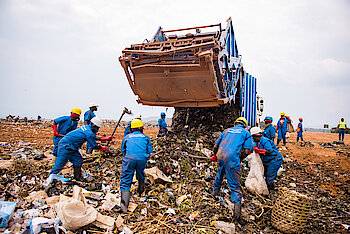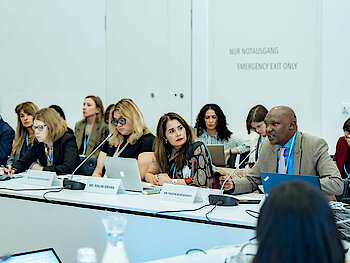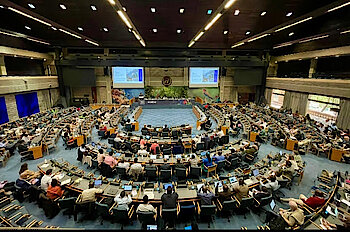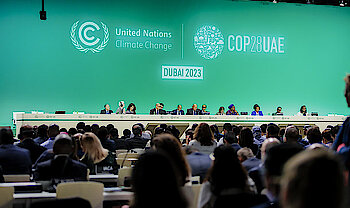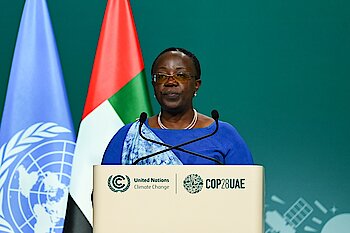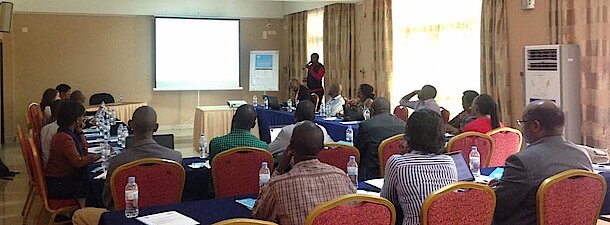
Rwanda NDCs Detailed Implementation Plan disseminated
Nowadays, climate change has become significant and emerging global challenge that the World is facing. Addressing the risks of climate change requires significant efforts by both the developed and the developing world. Unlike in the past years when Non Annex-I Parties (developing countries) to the United Nations Framework Convention on Climate Change (UNFCCC) had no obligations or commitments to reduce GHG emissions ; from Durban platform, developing countries were urged to join the global efforts to reduce GHG emissions.
The decision of the 19th session of the Conference of the Parties (COP 19) the UNFCCC held in Warsaw, Poland in 2013 invited all Parties to prepare and submit their Intended Nationally Determined Contributions (INDCs) to the UNFCCC secretariat before COP 21 held in Paris, France in December 2015.
With ratification of Paris Agreement (PA), the Intended Nationally Determined Contributions (INDCs) are no longer “Intended”, they have become Nationally Determined Contributions (NDCs) as Countries were recalled to look forward to the implementation of climate actions put forward in their NDCs.
In this line of joining global effort to combat climate change, following the ratification of Paris Agreement on 06th October 2016, Rwanda has developed a detailed implementation of Rwanda NDCs to translate committed adaptation and mitigation contributions into implementable measures. The detailed implementation plan of Rwanda NDCs was developed from May to June 2017 through a sector based consultative process. It maps stakeholders that are relevant to varying degrees for implementation.
The key sectors involved in NDCs implementation include Energy, Agriculture, Transport, Industry, Waste, and Forestry, Water use, Land use and Tourism.
Where possible the implementation estimates the costs and sustainable development co-benefits of the actions as well as Measurement, Reporting and Verification (MRV) of results and suggests timelines for their implementation. The plan also outlines capacity needs that must be addressed as well as barriers and risks that the different actions are facing in their implementation and provide recommendations and suggests next steps for a successful implementation
On 26th October 2017, at Lemigo Hotel in Kigali, Rwanda Environment Management Authority (REMA) has organized a dissemination workshop of the report on the detailed implementation plan NDCs to allow its smooth implementation.
To open the workshop, Mrs Coletha U. Ruhamya, Director General of REMA invited all sectors to refer to this implantation plan when implementing the actions related to their specific sectors. This implementation plan will help sectors to monitor how they are achieving the adaptation and mitigation contributions committed in Rwanda NDCs.
Topics
More posts
Rwanda to embark the development of Short-Lived Climate Pollutants Plan
Image: Nduba Landfill in Kigali City, (The landfll is known as one source of methane gas which is the greenhouse gas and the short lived pollutants);…
RWANDA’S NEGOTIATORS ARE IN BONN PUSHING FOR CLIMATE FINANCE
Rwanda’s negotiators led by Mr. Faustin Munyazikwiye – Deputy Director General of the Rwanda Environment Management Authority (REMA) – are in Bonn,…
Rwanda and Germany launch the “Kigali Climate Talks”
On 9 May 2024, Dr Jeanne d’Arc Mujawamariya, Rwanda’s Minister of Environment, and Heike Uta Dettmann, Ambassador of the Federal Republic of Germany,…
Tackling Short-Lived Climate Pollutants: Insights from CCAC2024 Conference
The Climate and Clean Air Conference 2024 (CCAC2024), took place in Nairobi, Kenya, on the sidelines of the Sixth session of the United Nations…
RWANDA WELCOMES HISTORIC COP28 DECISION TO TRANSITION AWAY FROM FOSSIL FUELS
The Government of Rwanda has welcomed the ground-breaking decision made at the 28th Conference of the Parties (COP28) to the United Nations Framework…
NATIONAL STATEMENT - COP28 UN CLIMATE CHANGE CONFERENCE
Delivered by Dr Jeanne d’Arc Mujawamariya, Minister of Environment
To begin, I express my gratitude to His Highness Sheikh Mohamed bin Zayed…
Follow the UNEP Pavilion Discussion on the Role of Industry & Finance in Supporting the Adaptation Agenda at COP28
This session, which comes at the conclusion of Industry Day is designed to offer comprehensive insights into the roles of industry and finance in…
Rwanda to call for more ambitious climate action at COP28
At this year’s UN Climate Change Conference, known as COP28, Rwanda will call for more ambitious climate action, a doubling of funding for adaptation…
Rwanda Green Fund Celebrates a Decade of Impact
The Rwanda Green Fund has marked its 10th anniversary, a remarkable milestone of transformative impact in Rwanda. Established in 2012, the Fund has…
